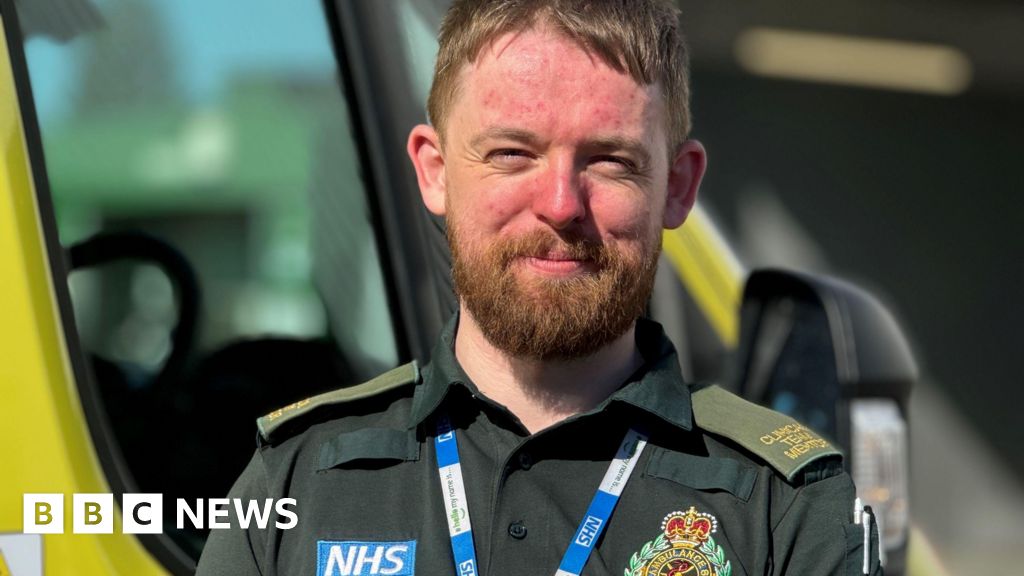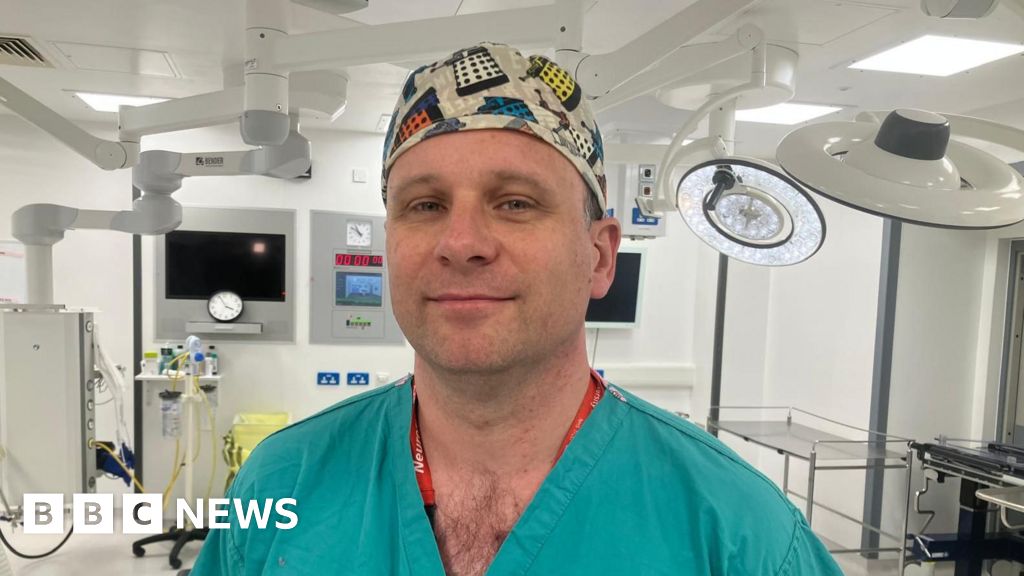ARTICLE AD BOX
By David Gregory-Kumar
Science, Environment & Rural Affairs, BBC News
Image source, Family
Image caption,Pam Bembenek died after contracting Covid in her care home
For almost a month last year a coronavirus testing lab in Wolverhampton sent out thousands of incorrect results telling people they were clear when in fact they were infected.
Immensa Labs is estimated to have sent out about 43,000 "false negative" results to people right across the south west of England.
We've been trying to find out what went wrong at Immensa and what the impact of this mistake actually was.
So many incorrect test results meant more people ended up infected, more people were hospitalised and, sadly, more people will have died.
People such as Pam Bembenek. She caught coronavirus on 18 October 2021, which was actually after testing was officially halted at Immensa.
She died five days later on 23 October 2021. Her granddaughter Amber Marshall said Mrs Bembenek had caught Covid from a worker at her care home - a worker who'd been given the wrong PCR test result.
Mrs Marshall said she had been told by a manager at the home near Dursley, Gloucestershire, the test result had said the worker was free from coronavirus when actually they were infected. The worker then brought the virus into a care home full of vulnerable older people. It was likely one of thousands of wrong results sent out by Immensa.
Amber Marshall's grandmother died from the virus five days after she caught it
Until that point the care home had managed to get through the whole pandemic successfully keeping coronavirus out.
According to Mrs Marshall, a number of other residents also tested positive alongside her grandmother, but she doesn't know if the others who were infected also died.
Authorities alerted
Image source, James Beecher
Image caption,James Beecher has been updating more than 5,000 members of his local area's Facebook community coronavirus group
The BBC has been told the incorrect results were sent out between 8 September and 12 October 2021. That's more than 30 days before the mistake was noticed and Immensa Labs was told to stop.
But we've found someone who tried to alert the government to the problems long before any official action was taken.
James Beecher is a resident of Stroud, in Gloucestershire, who correctly identified there was apparently something going wrong at a testing laboratory.
Had he been listened to, authorities could have started putting things right just 10 days after the problems seem to have started on 18 September.
That would have stopped thousands of incorrect results being sent out. It would certainly have been in time to save Mrs Bembenek's life.
Mr Beecher is one of the admins on the Stroud Coronavirus Community Response group on Facebook.
He's been updating more than 5,000 group members with the latest on the virus since the pandemic started.
On 18 September he posted about something very strange he noticed to do with coronavirus case numbers in Stroud and Gloucestershire. A sharp drop in daily cases from more than 300 to just 100.
Image source, Getty Images
Image caption,Covid case numbers in Stroud and other parts of Gloucestershire appeared to drop suddenly in September last year
Drops like this can happen in response to a big change like a lockdown. But at this point we weren't in lockdown. The number of cases just suddenly plummeted - Mr Beecher said they "just fell off a cliff".
In an email to his Facebook group, Mr Beecher wrote: "The decline is so deep that a problem at a testing lab may be involved."
That was on 18 September. And Mr Beecher was right.
Having noticed there appeared to be a problem, he tried to alert people to what was going on.
The local community, the people on his Facebook group and beyond, were really interested in what he was saying.
Mr Beecher said lots of people had been affected by incorrect PCR tests and they were grateful to be reassured their lateral flow test was almost certainly right.
He said he hoped some had indeed isolated and stopped spreading the virus further.
But Mr Beecher found the government, in the form of the Department of Health and Social Care (DHSC), to be "profoundly unhelpful" and it "essentially ignored me for a fortnight".
Mr Beecher wasn't just a random member of the public either. He was one of the department's own "Covid community leaders".
But rather than listen, the DHSC referred him to its media team who "promised to call but never did".
It turned out of course there was a huge problem at Immensa in Wolverhampton.
However, it would be another 24 days before testing was officially suspended at the lab. And in the meantime, people would die. Some, such as Mrs Bembenek, dying even after the lab was finally shut down.
Problems at Immensa
Image source, Other
Image caption,Immensa was set up three months after the first official case of Covid and has one officer and owner- Andrea Riposati
Immensa Health Clinic Limited was set up as a company just over three months after the first official case of coronavirus in the UK.
Shortly afterwards it received a £119m contract from the government to carry out coronavirus PCR tests.
Immensa as a company has one officer and owner - Andrea Riposati.
Just eight months into its short working life, Immensa featured in an undercover exclusive in the Sun on Sunday.
On 31 January 2021, staff at Immensa had been secretly filmed sleeping, playing football and fighting in the lab where testing was carried out.
According to the Sun on Sunday, a source inside the company said: "The company has been handed a multimillion-pound contract for the staff to just mess around and potentially ruin thousands of tests."
The Sun on Sunday asked Immensa to comment for the story but the company said nothing.
The government told the Sun on Sunday it was investigating the story, but the results of that investigation were never made public and despite these serious problems, Immensa was allowed to carry on with its vital testing work.
Seven months later the same company would issue thousands of incorrect "false negative" test results.
So what have we been able to find out about this young testing company at the centre of two different scandals?
£119m contract
Image source, Getty Images
Image caption,Testing at the Immensa Health Clinic, in Wolverhampton, was suspended after the errors were discovered
Like any company, Immensa Labs should file its accounts and these should then be available online for people to look at.
But as soon as the company was formed it shortened its financial year end to June 2020 and immediately filed the accounts, indicating the company had not traded and so only had £100 in the bank.
At this point this was technically true, but the company was in the process of bidding for a £119m government contract.
Companies do change the dates they use for the financial year. A nursery, for example, might sync the year up with term time, but it is unusual to do this.
Then, earlier this year Immensa extended its financial year to December 2021, which meant the next set of accounts do not have to be filed until September 2022 at the very latest.
This gives the company the maximum possible time to run its £119m contract, before it legally has to submit its financial statements to any kind of scrutiny.
One accountant told us this sort of behaviour is "rare" in a company.
This does mean we have to wait until September to see any details on how Immensa spent £119m of public money on a laboratory which clearly had some very real problems with the quality of its work.
'Answers in five minutes'
Prof Thiemo Fetzer is trying to get hold of testing data
We still don't know exactly how many incorrect results were sent out by Immensa Labs. The figure of 43,000 given by the government is actually an estimate based on the number of tests carried out and levels of coronavirus at the time.
How hard would it be then to find an exact number for incorrect tests and perhaps even find out the number of people who went on to die having been given the wrong result?
Given the government has promised an investigation into what happened but have so far failed to publish their report, perhaps it's the scale of the task holding things up. There are hundreds of thousands of results to check.
But one expert we spoke to believes it will take about five minutes to find out the answer. After that you could quickly comb the data and even start to work out exactly what went wrong.
Thiemo Fetzer is a professor of economics at the University of Warwick. He's been trying to use Freedom of Information requests to get hold of the testing data.
His requests are very specific, as you might expect from an expert.
He says he knows exactly which bit of the spreadsheets covering testing he needs to see. He thinks it would take minutes to do the checks and see who tested negative, according to the lab, after a positive lateral flow at home.
Then some really interesting stuff could be done with the results, quickly.
If the data shows errors were happening all of the time, then it is likely to be a problem with faulty equipment. But, if the errors happen in a pattern then it's likely a staff problem; issues arising when certain people were on shift.
Prof Fetzer sent two Freedom of Information requests to the part of the government that deals with infectious disease, the UK Health Security Agency (UKHSA). He is trying to get geographic breakdowns of case numbers and also breakdowns of negative PCR tests following positive lateral flows.
Both requests have been turned down. One on the grounds of cost and the other on the grounds the UKHSA may launch legal action against Immensa. Although it says this doesn't actually mean it would definitely take the company to court.
Prof Fetzer is appealing against both decisions via the Information Commissioner.
Unanswered questions
Image source, Family
Image caption,Pam Bembenek pictured in her younger days
We did manage to get a brief response ourselves from the UKHSA.
In a statement to the BBC, Dr Will Welfare, incident director for Covid-19 at the agency, said: "A full investigation remains ongoing and we will provide an update in due course; we cannot comment on any information that could form part of these investigations before they are complete.
"We suspended testing at the Immensa Wolverhampton laboratory following an ongoing investigation into positive LFD results subsequently testing negative on PCR. Those affected were contacted as soon as possible."
Immensa as a company has legally made sure it has the longest time available before it must reveal the financial details of the company and its £119m government contract.
The government has turned down several Freedom of Information requests from the BBC, asking for the full impact assessment detailing the excess death estimated and also asking for release of the report into what actually went wrong.
Prof Fetzer said when private companies were involved in public-health, they should be transparent and honest about how they worked. This is especially important when something goes wrong.
The DHSC told us a minister would not be available to talk about this.
Immensa and its parent company Dante Labs refused all our requests be interviewed.
Free testing ending
Image source, Getty Images
Image caption,Most people in England can now no longer get free LFTs
It's likely some deaths could have been avoided if the government had listened earlier to the people on the ground raising the alarm about Immensa Labs.
At the heart of this scandal is a young company that has released minimal information and where the quality of its work was called into question not once, but twice.
As free coronavirus testing for most comes to an end, we are left with a testing disaster that cost the taxpayer £119m and that almost certainly led to the unnecessary deaths of people including Mrs Bembenek.
It's a scandal many have forgotten about already. But plenty of people are still looking for answers about what went wrong at Immensa.
Follow BBC West Midlands on Facebook, Twitter and Instagram. Send your story ideas to: newsonline.westmidlands@bbc.co.uk
Related Internet Links
The BBC is not responsible for the content of external sites.

 3 years ago
103
3 years ago
103








 English (US) ·
English (US) ·